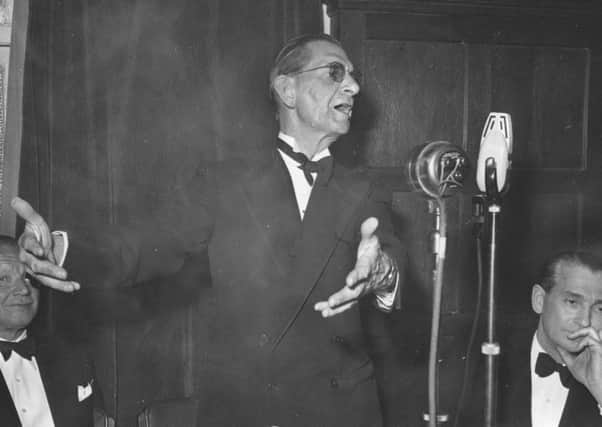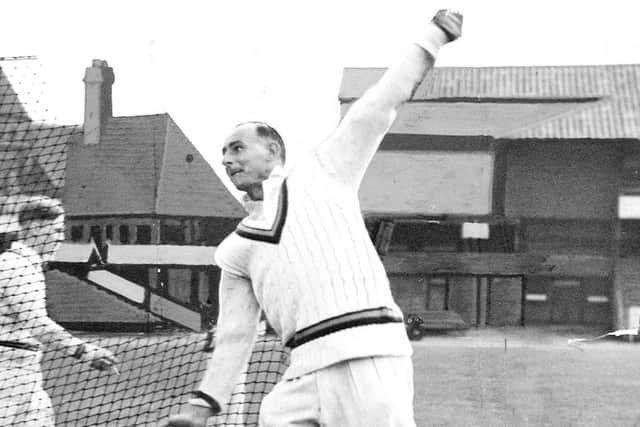Neville Cardus - story of the great cricket writer


I wasn’t alone. With perfect symmetry – and I swear this is true – I received an email from Sir Michael Parkinson at the very moment I dropped the question mark on the end of that opening paragraph. Parky was wondering as well what the man he called ‘our favourite cricket writer’ would have made of that last, gloriously mad three quarters of an hour. Here was proof that real life is nearly always more improbable than fiction is ever allowed to make it.
Bear with me; I’ll come back to what I said to Parky in reply.
Advertisement
Hide AdAdvertisement
Hide AdFirst, you need to know why Cardus matters, which will also explain why he and I were thinking about him in the hour of England’s fabulous triumph.


Cardus is the father of literate sports writing in this country. As John Arlott memorably said of him: ‘Just as there can never be a greater cricketer than W G Grace – because he created the whole technique of cricket, and no one can ever do that again – so there can never be a greater cricket writer’. Cardus, argued Arlott, created the art from scratch, leaving everyone else to perform what he’d shown them.
In his Golden Age, a roaring heyday between the Wars, Cardus’ writing about the game was so revolutionary and so beautifully descriptive that his work for the Manchester Guardian was anthologised in books of literature beside Virginia Woolf, D H Lawrence and Henry James.
Advertisement
Hide AdAdvertisement
Hide AdReporting about it had previously been a stick-dry affair, the statistics of a day’s play piled up like kindling. Cardus, who first walked into a press box exactly a century ago, decided to do things differently. He treated a match like a stage drama or a 500-page novel. The players were actors in it, and Cardus focussed on their quirky characteristics and foibles in a manner that evoked Dickens, the author he venerated.
Not bad for someone born illegitimately in the Manchester suburbs, raised in a semi-slum, practically abandoned by his mother – she took in laundry by day and practised The Oldest Profession by night – and who slowly taught himself to write like a dream by borrowing books from municipal libraries. He even came to cricket writing accidentally. The Manchester Guardian planned to send Cardus to only ‘one or two’ matches, a gesture designed to help him recuperate after a physical and mental breakdown. That represents just a slither of his extraordinary story.
As a young man, he resembled Charles Hawtrey, the scrawny and bespectacled actor of all those Carry On films. As an old one, he looked like a tortoise in glasses who had escaped from its shell. He never knew his year of birth. He was married for nearly half a century, the relationship unconsummated, and lived largely apart from his wife while doting on her nonetheless.
Advertisement
Hide AdAdvertisement
Hide AdHe earned pots of money and spent it. He was an introvert pretending to be an extrovert. And he regretted the fame cricket bestowed because it denied him the kudos he craved as a ‘serious’ music critic. The scale of that fame meant he could never shake cricket off; his audience wouldn’t allow it.
We should be very grateful for that. Those who don’t know Cardus have the pleasure of discovering him to come. Those who do often go back to his books, summoning summers of yesteryear. He left us prose poems about cricket, most of them set in the North.
He described the Roses Matches as ‘a combative blood feud’. On some mornings the crowd could be 30,000-strong, the game taking place in a ‘tiny island of green in a vast black sea’. He thought these contests were ‘more important than the Ashes’ to anyone who found it impossible to be impartial about them. They were ‘spiky with antagonism’ and revolved around ‘impassioned arguments, dour temper and sheer cussedness’.
As a Lancastrian, born and bred, Cardus was surprisingly tender towards the White Rose at a time when cricket was played everywhere here – on scrubland, on cobbled streets beneath lamps, in back yards and gardens. Whenever Cardus came into the county and spotted ‘a baby boy in a perambulator,’ he would mutter to himself: ‘There goes one of their cricketers of the future’. As for Yorkshire itself, he saw ‘something likeable, even lovable’ in it and felt ‘at kin with its folk’.
Advertisement
Hide AdAdvertisement
Hide AdCardus saw magnificent Yorkshire teams, winners of 12 County Championships between 1919 and 1939. He wrote lyrically about Sutcliffe and Holmes, Hutton and Leyland, Verity and Bowes. What he said about Wilfred Rhodes is worth preserving in a gilt frame. He believed Rhodes’ great skill was to benumb the batsman ‘minute by minute’, making him think each delivery would always plop ‘on the same spot at the same pace’ when actually the length and speed were infinitesimally, but crucially, different.
‘Every ball like every other ball, yet somehow unlike; each over in collusion with the rest, part of a plot; every ball a decoy, a spy sent out to get the lie of the land; some balls simple, some complex, some easy, some difficult; and one of them – ah, which? – the master ball’.
But no one embodied the absolute essence of Cardus’ writing like the ‘grizzled, squat, bandy-legged’ all-rounder Emmott Robinson. Out of a minor cricketer he created a major figure. ‘Few,’ he said of him ‘absorbed the game – the Yorkshire game – into their systems, their minds, nerves and bloodstreams’. Every breath he took was for Yorkshire. ‘It was for him a way of living, a mission and also his religion’.
Cardus died as long ago as 1975. Had he been living still, I am sure he would have been at Lord’s for the World Cup final. The Long Room was his second home.
Advertisement
Hide AdAdvertisement
Hide AdIt is presumptuous to speak for the dead, but I told Parky that Cardus, who liked a spectacle, would probably have written about July, 2019 in the same way he wrote about a different July day, also at Lord’s, in 1930. England lost to Australia in a match that progressed through a maze of abrupt turns, crazy twists of fortune and gasps of incredulity. Cardus rated it retrospectively as the greatest Test he ever witnessed. I remembered his match report and dived into a forest of paper to find it again. ‘The day’s play simply beggars description,’ he announced, as though having a premonition about those Super Overs. Near the end, come two more poignant sentences that perfectly sum up last Sunday too.
‘As the cricketers came from the field sunshine fell on them, touching them with a lovely light. It might well have been a light cast by immortality, for this match will certainly never be forgotten.’
To that you can only say this: ‘Well, played sir’.
Duncan Hamilton’s The Great Romantic: Cricket and the Golden Age of Neville Cardus is published by Hodder.